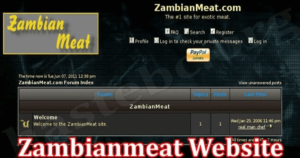What is a Zambian Website?
In the depths of the internet, beyond the surface accessible by conventional search engines, lies the dark web – a hidden network notorious for harbouring illicit activities. Zambian Meat is a term that has emerged from the dark web, shrouded in mystery and surrounded by controversy. It is not a term associated with any culinary delight from the African nation of Zambia, as the name might misleadingly suggest. Instead, it refers to a purported website that is rumoured to engage in promoting and possibly even facilitating acts of cannibalism.
A Summary of Zambian Meat Killer
The term “Zambian Meat” gained notoriety due to its connection to the infamous “Zambian Meat Killer.” This appellation is given to an individual or group that claims to operate on the dark web, using the pseudonym to spread fear and unease. This entity, if accurate, is purported to have posted graphic content and messages that hint at the consumption of human flesh. The veracity of these claims remains highly questionable, and these assertions may be more a creation of sensationalism and urban legends than actual occurrences.
Features of the Website
The alleged Zambian Meat website, reportedly accessible only through the dark web and specialized software, is said to have featured a sinister array of content. These supposed offerings include gruesome images, graphic descriptions, and narratives about cannibalistic acts. It is crucial to emphasize that accessing such content can be illegal in many jurisdictions, as it often involves promoting violence and criminal activities.
The Benefits of Using Zambian Meat
It might seem inconceivable that any benefits could be associated with a platform seemingly dedicated to the macabre. However, it’s essential to approach this topic with discernment and critical thinking. The term “Zambian Meat” and its associated dark website may be primarily creations of online folklore designed to evoke fear and unease. In this scenario, the only “benefit” would be its cautionary tale about the power of internet rumours.
Is This Site Safe to Explore?
The dark web is fraught with legal, ethical, and cybersecurity-related risks. While Zambian Meat may invoke morbid curiosity, exploring such sites can have serious consequences. Legal authorities worldwide are vigilant about cracking down on illicit activities on the dark web, and inadvertently stumbling upon illegal content could lead to severe legal repercussions. Moreover, interacting with such platforms can expose individuals to cybersecurity threats, including hacking and identity theft.
Zambian Meat Website Reviews
Due to the illicit and disturbing nature of the alleged Zambian Meat website, official reviews or assessments are practically non-existent. Given the secretive and illegal nature of the content, any attempt to review it could potentially lead to legal trouble. However, it’s essential to recognize that online spaces, even those on the dark web, can be subject to exaggeration, manipulation, and misinformation.
FAQs
Q1: Is Zambian Meat an actual website?
A1: The existence of the Zambian Meat website is widely disputed, with many experts considering it to be more of an internet legend than a reality.
Q2: Can I access the Zambian Meat website?
A2: If it exists, the website is reportedly accessible only through specialized software that enables entry into the dark web. However, attempting to access such content can lead to legal and cybersecurity risks.
Q3: Why is it called Zambian Meat?
A3: The name “Zambian Meat” is likely a sensationalized term used to evoke a sense of shock and horror rather than directly related to Zambia or its culinary culture.
Conclusion
In the internet’s intricate web, the Zambian Meat concept stands as a testament to the power of online myths and legends. While the dark web is a realm that harbours various illegal and disturbing activities, it’s crucial to approach such claims with scepticism and critical analysis. The integrity of the Zambian Meat website remains dubious, and its existence might be nothing more than a chilling tale spun to remind us of the potency of fear in the digital age. As responsible digital citizens, we should promote positive interactions and knowledge sharing rather than engaging in the shadows of the virtual world.











